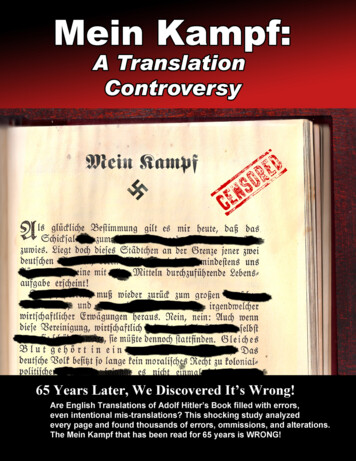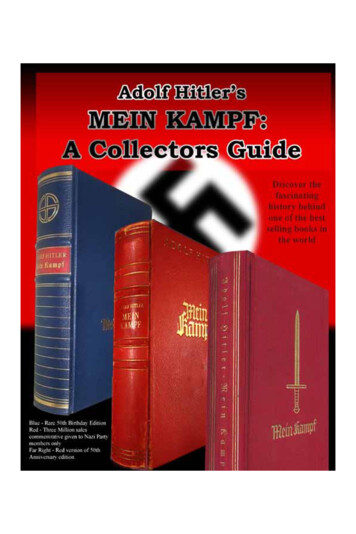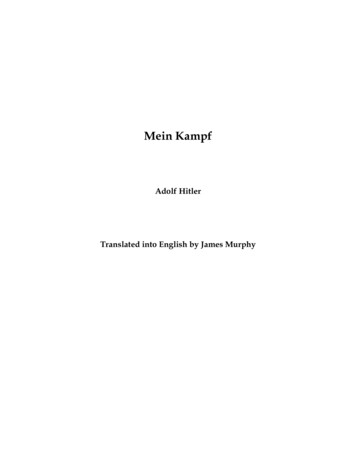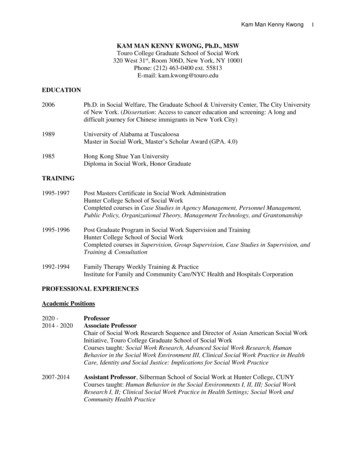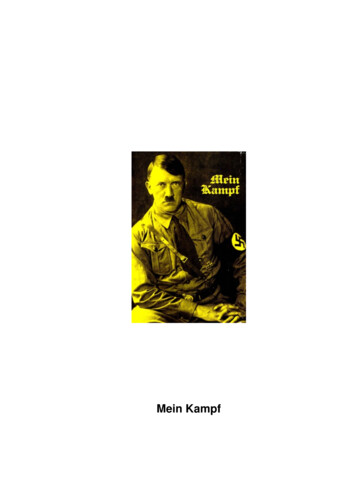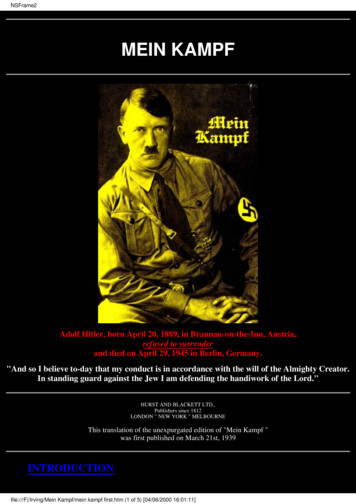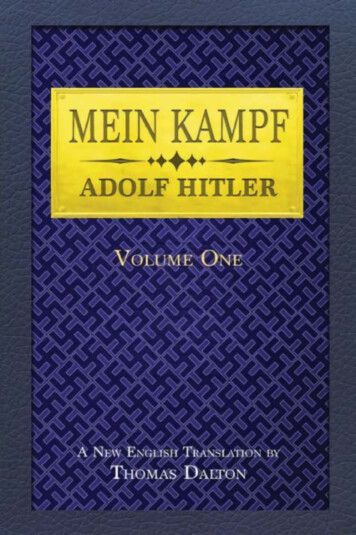
Transcription
MEIN KAM PFAD OLF H ITLE RVOLUME ONE
MEIN KAMPFAD O LF HITLERTRANSLATED FROM THE GERMANBYTHOMAS DALTONVOLUME ONENEW YORK, LONDONCLEMENS & BLAIR, LLC2018
CLEMENS & BLAIR, LLCIntroduction and English translation copyright 20 1 8 by Thomas Dalton, PhDAll rights reserved. No part of this publication may be reproduced, stored in aretrieval system, or transmitted, in any form or by any means, electronic,mechanical, photocopying, recording, or otherwise.Clemens & Blair, LLC, is a non-profit educational publisher.Library of Congress Cataloging-in-Publication DataHitler, Adolf ( 1 889- 1 945)Mein Kampf(vol . 1 )cm.p.Includes bibliographical references.ISBN 978- 1 97-4502967 (pbk.: alk. paper)Printing number: 9 8 7 6 5 4 3 2 1Printed in the United States of America on acid-free paper.
DE DICATIONAt 12:30 pm, on 9 November 1923, the following men fell in front of theFeldherrnhalle and in the courtyard of the former War Ministry inMunich, with loyal faith in the resurrection of their people:Alfarth, Felix; merchant; b. 5 July 1901Bauriedl, Andreas; hatter; b. 4 May 1879Casella, Theodor; bank clerk; b. 8 August 1900Ehrlich, Wilhelm; bank clerk; b. 19 August 1894Faust, Martin; bank clerk; b. 27 January 1901Hechenberger, Anton; locksmith; b. 28 September 1902Komer, Oskar; businessman; b. 4 January 1875Kuhn, Karl; headwaiter; b. 26 July 1897Laforce, Karl; engineering student; b. 28 October 1904Neubauer, Kurt; valet; b. 27 March 1899Pape, Claus von; businessman; b. 16 August 1904Pfordten, Theodor von der; court councilor; b. 14 May 1873Rickmers, Johann; retired captain; b. 7 May 1881Scheubner-Richter, Max Erwin von; doctor of engineering; b. 9January 1884Stransky, Lorenz von; engineer; b. 14 March 1889Wolf, Wilhelm; businessman; b. 19 October 1898The so-called national authorities refused these dead heroes a commongrave.Therefore, for the common memory, I dedicate to them the first volume ofthis work. As martyrs to the cause, may they shine forever, as a permanentinspiration to the followers of our movement.AdolfHitlerLandsberg am Lech16 October 1924
CONTENTSIntroduction by Thomas Dalton13VOLUME ONE: A RECKONING1. IN MY PARENTS' HOUSE1. 1The Young Ringleader1.2' Choice' of Profession1.3Never a Civil Servant. . .1.4. . . But Rather an Artist1.5The Young Nationalist1.6The German Ostmark1.7The Struggle for Germanism1.8Lessons from History1.9Devotion to Wagner1. 10 The Death of my Parents454647484949505155562. YEARS OF STUDY AND SUFFERING IN VIENNA2.1Skill as an Architect2.2Formation of a Worldview2.3Removal of Petty-Bourgeois Blinders2.4Vienna's Social Conflicts2.5The Laborer2.6Fate of the Worker2.7The Path to Improvement2.8Lack of 'National Pride'2.9The Ordeal of the Worker 's Child2. 10 Young Despiser of Authority2. 11 Architect and Watercolor Painter2. 12 The Art of Reading2.13 Social Democracy2.14 The Social-Democratic Press2.15 Social-Democratic Tactics2. 16 Sins of the Bourgeoisie2.17 The Trade Union Question2. 18 Politicization of the Trade Unions2. 19 The Key to Social Democracy2.20 The Jewish Question5859606162636667686970717376788080828485
2.212.222.232.242.252.262.27The So-Called World PressCriticism of Kaiser Wilhelm IITransformation into an Anti-SemiteThe Jew as Leader of Social DemocracyJewish DialecticsStudy of the Foundations of MarxismMarxism as Destroyer of Culture868788939596973. GENERAL POLITICAL REFLECTIONS FROM MY TIME INVIENNAThe Politician3.11003 .2Vienna 's Last Revival1013 .3Germandom in Austria102103Centrifugal Forces of the Austrian People3.4Consequences of Ethnic Diversity3.51043.6Joseph II105106The Dissolution of the Habsburg Monarchy3.7Parliamentarianism3.81071113.9Lack of Responsibility1123.10 The Destruction of the Idea of Leadership1133.11 The Exclusion of the Individual Leader3.12 ' Public Opinion'1153.13 The Majority Principle1173.14 The Destruction of Character1201213.15 Jewish Democracy1223.16 The Collapsing Dual Monarchy1243.17 Rebellion of the German-Austrians1253.18 Human Rights override States ' Rights3.19 Schonerer and Lueger1273.20 The Causes of Schonerer 's Failure1303.21 Pan-Germans and Parliament131Word3 .22The Importance of the Spoken3.233.243.253.263.273.283.293.30Effect on the MassThe 'Away-from-Rome' MovementConcentration on a Single EnemyThe Way of Christian SocialismAnti-Semitism on a Religious BasisPan-Germanism and Christian SocialismGrowing Aversion to the Habsburg StateThe School of My Life134135136144145146147149150
4. MUNICH4. 14.24.34.44.54.64.74 84.94. 1 04. 1 14. 1 24. 1 34. 1 45.Germany's Defective Alliance PolicyThe Four Paths of German PolicyAcquisition of New LandWith England, Against RussiaSolution to the Austrian AllianceEconomic Expansion PolicyWith Russia, Against EnglandGerman Caricature of the EnglishmanInner Weakness of the Triple AllianceLudendorff's 1 9 1 2 MemorandumAustria as a Tempting LegacyState and EconomyThe Moment of DecayGermany's Attitude toward Marxism1 541 571 621 641 651 661 671 681 691 701711 721 761 77THE WORLD WAR5.15.25.35 .45.55 .65.75. 85.95.10The Austrian UltimatumThe German War for FreedomEnlistment in a Bavarian RegimentBaptism by FireFrom Young Volunteer to Old SoldierArtificial Dampening of EnthusiasmMisrecognizing MarxismThe Use of Naked ForceAttack of a WorldviewBourgeois Class Parties1811 831 841 851 861 871 881 891911 926. WAR PROPAGANDA6. 16.26.36.46.56.6The Purpose of PropagandaPropaganda Only for the MassesThe Psychology of PropagandaSubjective-One-Sided-Necessary !Restriction on PerseveranceEnemy War Propaganda1 961 971 992002022037. THE REVOLUTION7.17.27.3The First Enemy LeafletsWoundedBoasting o f Cowardice206207208
7 .47.57.67.77.87.97.107. 1 17. 127. 137. 1 4SlackersHatred of PrussiaThe Army's New HopeThe Allies are Beaten Down"Germany Facing Revolution! "Last Wreaths of Immortal LaurelGrowing Moral DecayPoisoned by Mustard Gas'Republic 'All Sacrifice in VainDecision to Enter Politics20921021 121221421521621721922022 18. THE BEGINNING OF MY POLITICAL ACTIVITY8. 18 .28.38.48.58.6Discussion of the Formation of a New PartyTwo Types of CapitalTheoretician and PoliticianMarathon Runners of HistoryThe Fight against International Finance CapitalThe 'Educational Officer '22422522622822 82309. THE ' GERMAN WORKERS' PARTY'9. 19.29.3The ' German Workers' Party'The ' Committee Meeting'A Final Decision23223423610. CAUSES OF THE COLLAPSE1 0. 11 0.21 0.31 0.410.51 0.61 0.710.81 0.910. 1 01 0. 1 110. 121 0. 1 31 0. 1 41 0. 1 5The Sign of CollapseThe Causes of CollapseEvery Third German a TraitorMoral Disarmament of a Dangerous AccuserToxins and SymptomsThe Rule of MoneyInternationalization through FinanceGravediggers o f the Monarchy'Fighters for the Monarchy'Cowardice in the Face of ResponsibilityThree Groups of Newspaper ReadersState and PressJewish Press TacticsThe ' Respectable ' PressSyphilis24024 124324524624724824925 125225225425525 5257
1 0. 1 610. 1 71 0. 1 81 0. 1 91 0 .201 0.2 11 0.221 0.231 0 .241 0.251 0 .261 0.271 0.281 0.291 0.301 0.3 11 0.321 0. 3 31 0.34The Sin against Blood and RaceThe Task of Combating SyphilisSound Mind only in Sound BodyThe Fight against Spiritual PoisoningThe ' Protection Clause'The Bolshevization of ArtVilification of a Great PastSpiritual Preparation for BolshevismModem Masses of HumanityReligious ConditionsPolitical Misuse of ReligionAimlessness of German PolicyParliamentary Half-MeasuresParliamentary Crimes against the ArmyFailed Navy PolicyGerman AdvantagesThe Army-An Irreplaceable SchoolThe Incomparable Civil ServiceState Authority25926 126226326526626827027 127427527527727827928228428628711. NATION AND RACE11.11 1 .21 1 .31 1 .41 1 .51 1 .61 1 .71 1 .81 1 .91 1 . 1011.111 1 . 1211.131 1 . 141 1.151 1 . 1611.1711.181 1.191 1 .20The Result of Racial MixingMan andideaRace and CultureThe Aryan as Founder of CultureEffects of Blood-MixingService to the CommunityPurest Idealism, Deepest KnowledgeAryan and JewConsequence of Jewish EgoismSham Culture of the JewsThe Jew, a ParasiteJewish ' Religious Community'Jewish Religious DoctrineThe ' Elders of Zion'The Way of JewryStanding of the Factory WorkerJewish TacticsThe Core of the Marxist WorldviewOrganization of Marxist World-DoctrinePalestine as Organizational Center29 129 12932942982993013023043 043 053073083 09310318320321322325
1 1 .2 11 1 .221 1 .231 1 .24Dictatorship of the ProletariatFrom National Jews to Racial JewsBastardized PeopleFailure to Recognize the Inner Enemy32632732732812. THE FIRST PERIOD OF DEVELOPMENT OF THENATIONAL SOCIALIST GERMAN WORK ERS' PARTY12. 11 2.21 2 .31 2.41 2.51 2 .61 2 .712.81 2.91 2. 101 2. 1 11 2. 1 21 2. 1 312. 1412.1512.161 2. 1 71 2. 1 81 2. 1 91 2.201 2.2 11 2.22Situation after the RevolutionRecovery of Political PowerWinning Over the Broad MassesNationalization of the MassesHighest Authority, Highest ResponsibilityNeither Monarchist nor RepublicanThe Necessary Evil of OrganizationInner Structure o f the MovementEducation for StruggleEducation for Respect o f the PersonDanger of ObscurityThe First MeetingSoldiers as the Basis of the MovementSecond MeetingInner Formation of the MovementTin Swords and Tanned BearskinsRej ection of the Word 'Folkish'' Intellectual Weapons , ' ' Silent Workers'First Great Mass MeetingPohner and FrickDrafting the ProgramA Movement on the March3323333343363423433443473483493503513523543 55356357358359361362362Appendix A: The 25 Points of the National Socialist Program365Bibliography369Index37 110
MEIN KAM PF
ME I N KAMP F :AN I NTRODUCTIONTHOMAS DALTONMein Kampf is the autobiography and articulated worldview of one ofthe most consequential and visionary leaders in world history. It is also oneof the most maligned and least understood texts of the 201h century. Therehave been so many obfuscations, deceptions, and outright falsehoodscirculated about this work, that one scarcely knows where to begin.Nonetheless, the time has come to set the story straight.That Adolf Hitler would even have undertaken such a work is mostforti.mate. Being neither a formal academic nor a natural writer, and beingfully preoccupied with pragmatic matters of party-building, he may neverhave begun such a major task-were it not for the luxury of year-long j ailterm. In one of the many ironies of Hitler 's life, it took just such an adverseevent to prompt him to dictate his party's early history and his own lifestory. This would become volume one of his two-part, 700-page magnumopus. It would have a dramatic effect on world history, and initiate a chainof events that has yet to fully play out. In this sense, Mein Kampf is asrelevant today as when it was first written.Perhaps the place to begin is with the rationale for the book. Why didHitler write it at all? Clearly it was not a requirement; many maj orpoliticians in history have come and gone without leaving a personalwritten record. Even his time in prison could have been spentcommunicating with party leaders, building support, soliciting allies, andso on. But he chose to spend much of his stay documenting the origins andgrowth of his new movement. And for this we can be grateful.13
ME IN KAMPFThe work at hand seems to have served at least four purposes for itsauthor. First, it is autobiographical. This aspect consumes most of the firsttwo chapters, and is repeatedly woven into the remainder of volume one.For those curious about the first 35 years of Hitler 's life, this aspect isinvaluable. It gives an accurate and relevant account of his upbringing, hiseducation, and the early development of his worldview. Like anyautobiography, it provides an irreplaceable first-hand description of a life.But as well, it offers the usual temptation to cast events in a flattering light,to downplay shortcomings, or to bypass inconvenient episodes. On thiscount, Hitler fares well; he provides an honest and open life story, devoidof known fabrications, obvious errors, or significant omissions. This bookis essential for understanding his thinking and attitude on social, economic,and political matters that are of central concern.Second, Mein Kampf is a kind of history lesson of Europe around thetum of the 20th century. Hitler was a proximate observer-and often first hand witness-to many of the major events of the time. He served in thetrenches of World War One for more than four years, which was virtuallythe entire duration of the war. Serving on the ' losing ' side, he naturallygives a different interpretation of events than is commonly portrayed byhistorians of the victorious nations. But this fact should be welcomed byany impartial observer, and in itself makes the book worth reading. Withrare exception-such as Jiinger 's Storm of Steel-no other contemporarynon-fiction German source of this time is readily available in English. Forthose interested in the Great War and its immediate aftermath, this book isirreplaceable.In its third aspect, the book serves to document the origins and basicfeatures of Hitler 's worldview. This, unsurprisingly, is the most distortedpart of the book, in standard Western accounts. Here we find the insightsand trigger events that led a young man without formal higher education,to develop a strikingly visionary, expansive, and forward-looking ideology.Hitler 's primary concern, as we read, was the future and well-being of theGerman people-all Germans, regardless of the political unit in which theylived. The German people, or Volk, were, he believed, a single ethnicitywith unique and singular self-interests . They were-indisputably responsible for many of the greatest achievements in Western history. Theywere among the leading lights in music, literature, architecture, science,and technology. They were great warriors, and great nation-builders. Theywere, in large part, the driving force behind Western civilization itself. Allthis is true and undeniable, and Hitler is justly proud of his heritage. Equally14
INTRODUCTIONis he outraged at the indignities suffered by this great people in then-recentdecades-culminating in the disastrous humiliation ofWWI and the Treatyof Versailles. He seeks, above all, to remedy these injustices and restoregreatness to the German people. To do this, he needs to identify both theirprimary opponents and the defective political ideologies and structures thatbind them. Then he undertakes to outline a new socio-political system thatcan carry them forward to a higher and rightful destiny. He accomplishesall this, and more.Finally, in its fourth aspect, Mein Kampfis a kind of blueprint for action.It describes the evolution and aims of National Socialism and the NSDAP,or Nazi Party, in compelling detail. Hitler naturally wants his newmovement to succeed in assuming power in Germany and in a futureGerman Reich. But this is no theoretical analysis. Hitler is nothing if notpragmatic. He has concrete goals and precise means of achieving them. Hehas nothing but disdain for the geistigen Waffen, the intellectual weapons,of the impotent intelligentsia. He demands results, and success. By allaccounts, he achieved both.Importantly, his analysis is, in large part, independent of context. It doesnot pertain only to Germans, or only to the circumstances of the mid- l 920s.It is a broadly universal approach based on the conditions of the modemworld, and on human nature. As such, Hitler's analysis of action is relevantand useful for many people today-for all those who might strive forgreatness in body and spirit.This complex textual structure of Mein Kampf explains some of thecomplaints of modem-day critics who decry Hitler 's lack of ' coherence 'o r ' narrative flow. ' H e has many objectives here, and i n theirimplementation, many points overlap. Perhaps he should have written fourbooks, not one. Perhaps. But Hitler was a doer, not a writer. We must acceptthis fact, take what we have, and do our best to understand it in an openand obj ective fashion. He was not striving for a best-selling novel. Hewanted to document history and a movement, and to this end he succeededmost admirably.ORIGINS AND CONTEXTGiven that the book is, in large part, autobiographical, there is clearlyno need to detail Hitler 's life here. Even so, a few basic facts are in order,to establish the context of the work. Born on 20 April 1 889 in present-day15
ME IN KAMPFAustria, Hitler grew up as a citizen of the multi-ethnic state known as theAustro-Hungarian Empire. This diverse amalgamation was formed in 1867,with the union of the Austrian and Hungarian monarchies; thus does Hitlerrefer to the state as the "Double Monarchy." Throughout its 50-year history,it was always a loose conjunction of many ethnicities, and never a trulyunified state. The ethnic Germans in it were a minority, and had to struggleto promote their own interests. This fact caused Hitler no end of distress;he explicitly felt more attachment to the broader German Volk than to themulti-ethnic state into which he was born.As a youth, his interests tended toward the arts, painting, and history. Thisled to conflict with his obstinate father, who envisioned a safe, comfortable,bureaucratic career for his son. But his father 's death on 3 January 1 903 ,when Adolf was 13, allowed the young man to determine his own future.Two years later he moved to Vienna, scraping by with manual labor jobs tosurvive. In late 1907, his mother died. At the age of 1 8, he then applied toenter the Viennese arts academy in painting, but was diverted to architecture.He worked and studied for two more years, eventually becoming skilledenough to work fulltime as a draftsman and painter of watercolors.All the while, he studied the mass of humanity around him. He read thevarious writings and publications of the political parties. He observed theworkings of the press. He watched how unions functioned. He sat in onParliament. He followed events in neighboring Germany. And he becameintrigued by the comings and goings of one particular Viennese minority:the Jews.Gradually he became convinced that the two dominant threats toGerman well-being were Marxism-a Jewish form of communism-andthe international capitalist Jews. The problems were compounded by thefundamentally inept workings of a representative democracy that tried toserve diverse ethnicities. In the end, the fine and noble concept ofdemocracy became nothing other than a "Jewish democracy," working forthe best interests of Jews instead of Austrians or Germans.Upon turning 23 in 1 9 1 2, Hitler went to Munich. It was his first extendedcontact with German culture, and he found it invigorating. He lived therefor two years, until the outbreak of WWI in July 1 914. Thrilled at theopportunity to defend the German homeland, he enlisted, serving on theWestern front in Belgium. After more than 2 years of service, he was lightlywounded in October 1 9 16 and sent back to Germany, spending some timein a reserve battalion in Munich. Appalled at both the role of Jews there andthe negative public attitude, he returned to the front in March 1 9 1 7.16
INTRODUCTIONBy this time, the war had been dragging o n fo r some two and a halfyears. It had effectively become a stalemate. Even the looming entrance ofthe Americans into the war-President Wilson would call for war the nextmonth, and US troops would soon follow-would have little near-termeffect. As Hitler explains, however, the Germans actually had reasons foroptimism by late 1917 . The Central Powers (primarily Germany andAustria-Hungary) had inflicted a decisive defeat on Italy in the Battle ofCaporetto, and the Russians had pulled out of the war after the Bolshevikrevolution, thus freeing up German troops for the Western front. Hitlerrecalls that his compatriots "looked forward with confidence" to the springof 1918, when they anticipated final victory.NOVEMBER REVOLUTION, AND A NEW MOVEMENTBut things would tum out differently. German dissatisfaction with theprolonged war effort was being fanned by Jewish activists calling for massdemonstrations, strikes, and even revolution against the Kaiser. In lateJanuary 1918 there was a large munitions strike. Various workers ' actionsand riots followed for months afterward. The Western front held, butGermany was weakening internally.In mid-October of 1918, the German front near Ypres, Belgium was hit withmustard gas. Hitler's eyes were badly affected, and he was sent to a militaryhospital in Pasewalk, north of Berlin. In late October, a minor naval revolt inKiel began to spread to the wider population. Two major Jewish-led parties, theSocial Democrats (SPD) and the Independent Social Democratic Party (USPD),agitated for the Kaiser to abdicate-which he did, on November 9. Jewishactivists in Berlin and Munich then declared independent "soviet" states; for adetailed discussion of these events, see Dalton (2014). Germany formallycapitulated on November 11. After the dust had settled, a new 'Weimar'government was formed, one that was notably sympathetic to Jewish interests.Hearing about the revolution from his hospital bed, Hitler wasdevastated. All the effort and sacrifices made at the front had provenworthless. Jewish agitators in the homeland had succeeded in whipping uplocal dissatisfaction to the point that the Kaiser was driven from power.The revolutionaries then assumed power and immediately surrendered tothe enemy. This was the infamous "stab in the back" that would hauntGerman nationalists for years to come. And it was the triggering event thatcaused Hitler to enter politics.17
ME IN KAMPFIn September 1919, working for the government, he was assigned tofollow and report on a little-known group called the DeutscheArbeiterpartei, or German Workers ' Party (OAP). He ended up j oining thegroup, and quickly assumed a leadership role. By early 1920, Hitler'sspeeches were drawing hundreds or even thousands of people. On February24, he announced that the party would henceforth be known as the NationalSocialist German Workers ' Party, or NSDAP-'Nazi, ' in the parlance ofits detractors. It is with this "first great mass meeting" that Hitler closesvolume one of his book.The new movement grew rapidly. Hitler formalized his leadership inJuly 1921. A series of stormy and occasionally violent public eventsoccurred in the following months. In November 1 922, ideologicalcompatriot Mussolini took power in Italy, which served to bolster bothNational Socialist efforts domestically and their international reputation.It was on November 2 1 that the New York Times printed its first majorarticle on Hitler: "New Popular Idol Rises in Bavaria." Calling the Nazis"violently anti-Semitic" and "reactionary" but "well disciplined," the NYTviewed them as "potentially dangerous, though not for the immediatefuture." Indeed-it would not be for another 10 years that they wouldassume power in Germany.Soon thereafter, other events would favor the National Socialists. Francehad occupied the Ruhr valley in January 1923 , claiming a violation ofVersailles; this was taken as a grave insult to German sovereignty. It wasalso at this time that the infamous German hyperinflation took hold, wipingout the savings of ordinary Germans and forcing them to haul aroundbushels of cash for even the smallest purchases. By the end of the year,Germany was in a full-blown financial crisis. This led Hitler and theNSDAP leadership to plan for a revolutionary take-over of Munich on 9November 1923 .This attempted 'putsch, ' or coup, would fail. In a brief shoot-out, 16Nazis and four policemen were killed. Hitler and the other leaders werearrested within days, put on trial in February 1924, and sentenced to lightprison terms. In all, Hitler spent some 13 months in confinement, obtainingrelease in December of that year. It was during this time that he dictatedwhat would become volume one of his book.Hitler reportedly wanted to call his new book, "Four and a Half Yearsof Struggle against Lies, Stupidity, and Cowardice." The publisher adroitlysuggested a shorter title: "My Struggle," or Mein Kampf It would initiallybe published in July of 1925.18
INTRODUCTIONHitler then began a second, shorter volume to complete his program.This appeared in December of 1 926. The next year, the two volumes wereslightly revised and combined into one work. This 1 927 ' second edition'of Mein Kampf, published when Hitler was 3 8 years old, is the version usedin the present translation.CHAPTER SYNOPSESIt will be useful at this point to provide a very brief summary of themain themes of each of the 27 chapters in the book.VOLUME ONEChapter 1 : In My Parents' House. Hitler 's early life. Relationship withparents. Early education. Interest in history and art. Budding nationalism.Covers birth in 1 889 to mother 's death in late 1 907, when Hitler was 1 8years old.Chapter 2: Years of Study and Suffering in Vienna. Time alone inVienna. Marxism and international Jewry as main threats. Assessment andcritique of Viennese government. Life of the working class. Study of theSocial Democratic party, and its Jewish influence. Role of unions.Burgeoning anti-Semitism. Study of the destructive role of Marxism.Chapter 3: General Political Reflections from my Time in Vienna.Observations on Austrian politics and representative democracy. Failings ofmulti-ethnic states. Critique of Western democracy. Failings of 'majority rule. 'Demise of the pan-German movement. Unfortunate conflict with the CatholicChurch. Anti-Semitism and religion. Covers period up to age 23 ( 1 9 1 2).Chapter 4: Munich. Moves to Munich. Critique of German alliances. Fourpossible paths of German policy. Population growth, and the need for land.Need for alliance with England. Initial discussion of the role of Aryans.Marxism as mortal foe. Covers up to mid-1914.Chapter 5: The World War. Outbreak of World War One. Hitler enlists,at age 25. "Baptism by fire."Chapter 6: War Propaganda. Role and need for propaganda. Effectiveuse by England; failure by Germany.Chapter 7: The Revolution. Course of the Great War. Wounded in late1 9 1 6. Jews and negative attitudes rampant in Munich. Munitions strike inearly 1 9 1 8. Poisoned by mustard gas in October 1 9 1 8, at age 29. NovemberRevolution.19
MEIN KAMPFChapter 8: The Beginning of my Political Activity. Postwar time inMunich. Need for a new party. Negative role of global capitalism.Chapter 9: The 'German Workers' Party. ' Encounters German Workers 'Party (OAP). Early meetings. Joins OAP, as member #7, at age 30.Chapter 10: Causes of the Collapse. Analysis of the collapse of theGerman Empire in 1918. Dominance of international capitalism. Effect ofthe press on the masses. Jewish control of press. Combating the syphilisepidemic. Cultural decay in modern art. Ineffective parliament. The armyas a source of discipline.Chapter 11: Nation and Race. Detailed racial theory. Nature strives toimprove species. Racial mixing between 'higher ' and ' lower ' types yieldsphysical, moral, and cultural decay. Aryans as true founders of civilization.Aryan tendency for self-sacrifice. Aryan versus Jew. Jews as parasites. FakeJewish 'religion.' Extended examination of "the way of Jewry"-historical,sociological, political. Marxist worldview. Jewish subversion ofdemocracy. Ill-effects of racial impurity.Chapter 12: The First Period of Development of the NSDAP. Evolution·of OAP. Extended discussion of the need to nationalize the masses. Howto organize a party. Gaining publicity. Second major meeting in October1 9 1 9 . Growing success. Rejection of ' intellectual ' weapons . First trulymass meeting in February 1920. Transition to NSDAP.VOLUME TWOChapter 1: Worldview and Party. Corruption of democracy. Concept of' folkish. ' Transforming ideals into practice. Marxism pushes race equality.State must serve racial function: to promote the best.Chapter 2: The State. Three conventional concepts of state. State as meansto end: advancing human race. Must maintain racial integrity. Strong minoritiesend up ruling. Racial mixing leads to decay. State must promote healthychildren. Basic eugenic theory. Folkish education, for physical, mental, andmoral strength. Promote willpower, determination, responsibility. Meritocracy.Chapter 3: Subjects and Citizens. Citizenship based on race. Threeclasses: citizen, subject, foreigner.Chapter 4: Personality and the Folkish Concept of the State.Aristocratic principle. Value of the individual. Marxism promotes massthinking. Government rule by the best individuals, not majority.Chapter 5: Worldview and Organization. Need for an uncompromisingworldview. Need for decisive leadership . 25 -point NSDAP program isunshakable. Only NSDAP is truly folkish.20
INTRODUCTIONChapter 6: Early Struggle-Significance of Speech. NSDAP mustdominate mass opinion. Must fight against common views. Brest-Litovskand Versailles. Importance of spoken word. Marxism flourished withspeeches. Need for mass meetings.Chapter 7: Wrestling with the Red Front. Resumes autobiography, fromearly 1 920. Lame bourgeois mass meetings. Need for publicity. Control ofmass meetings. Violent protests. Party flag and symbol: swastika. First usein summer 1 920. Party strength by early 1 92 1 . Mass meeting 3 Feb atCircus Krone. Attempted disruption.Chapter 8: The Strong One is Most Powerful Alone. Right of priority.Many folkish movements. Futility of compromise and coalition.Chapter 9: Basic Ideas on the Meaning and Organization of the SA.Three pillars of authority. In warfare, survival of the inferior. Deserters andJewish revolutionaries in November 1 9 1 8 . Bourgeois capitulation. Needfor a great ideal. Creation of the SA (storm troops). NSDAP is neither secretnor illegal. SA as trained fighters. March to Coburg in Oct 1 922. Frenchoccupation of the Ruhr.Chapter 10: Federalism as a Mask. War industries in World War I.Bavaria versus Prussia as diversion. Kurt Eisner, Jewish. revolutionary.Growth of anti-Semitism from 1 9 1 8 . Catholic versus Protestant asdiversion. Federation versus unification. Opposition to Jewish Weimar.Chapter 1 1 : Propaganda and
MEIN KAMPF ADOLF HITLER VOLUME ONE . MEIN KAMPF ADOLF HITLER TRANSLATED FROM THE GERMAN BY THOMAS DALTON VOLUME ONE NEW YORK, LONDON CLEMENS & BLAIR, LLC . Printed in the United States of America on acid-free paper. DEDICATION At 12:30 pm, on 9 November 1923, the following men fell in front of the

